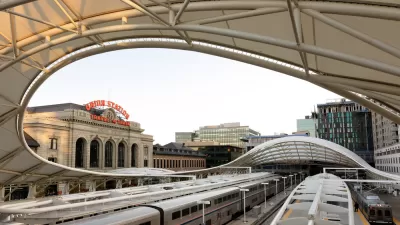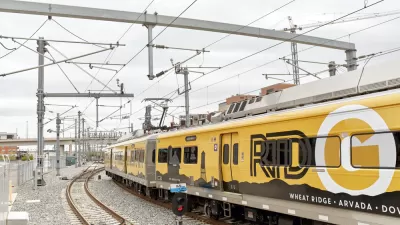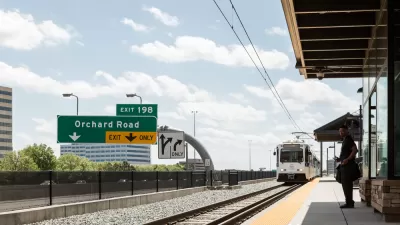With a slew of new rail transit lines opening on the FasTracks system, Denver-area suburbs are readying their development environments for transit-oriented opportunities.

John Aguilar reports on the land use decisions of the city of Wheat Ridge—a bedroom community west of Denver—in preparation for the region's expanding transit system.
The city approved a zoning change that will allow for "a sizable multifamily housing development to go in next to the end-of-the-line station on the G-Line," according to Aguilar. The G Line is expected to open to service in October, as part of a series of transit openings in the region this year, as part of the FasTracks system expansion.
Wheat Ridge isn't the only Denver-area suburb to make room for more multi-family development, according to Aguilar. "Twenty miles away, Lone Tree has massive plans at not only its existing Lincoln Station light rail stop but for three additional stations that will be built over the next two years as part of the Regional Transportation District’s Southeast Rail Extension." The mayor of Lone Tree has described transit-oriented development as a "new Colorado Gold Rush."
Back in Wheat Ridge, the zoning change isn't the only way the city is preparing for its new transit options. "Wheat Ridge recently hired a consultant to help identify the steps it needs to take to 'catalyze TOD development' at the station while voters this fall will decide whether to pass a sales tax increase that will pump $12 million into street construction and a pedestrian bridge at the site," writes Aguilar.
FULL STORY: Wheat Ridge planning to turn its lone rail stop into a slice of urban living in the suburbs

Alabama: Trump Terminates Settlements for Black Communities Harmed By Raw Sewage
Trump deemed the landmark civil rights agreement “illegal DEI and environmental justice policy.”

Planetizen Federal Action Tracker
A weekly monitor of how Trump’s orders and actions are impacting planners and planning in America.

The 120 Year Old Tiny Home Villages That Sheltered San Francisco’s Earthquake Refugees
More than a century ago, San Francisco mobilized to house thousands of residents displaced by the 1906 earthquake. Could their strategy offer a model for the present?

In Both Crashes and Crime, Public Transportation is Far Safer than Driving
Contrary to popular assumptions, public transportation has far lower crash and crime rates than automobile travel. For safer communities, improve and encourage transit travel.

Report: Zoning Reforms Should Complement Nashville’s Ambitious Transit Plan
Without reform, restrictive zoning codes will limit the impact of the city’s planned transit expansion and could exclude some of the residents who depend on transit the most.

Judge Orders Release of Frozen IRA, IIJA Funding
The decision is a victory for environmental groups who charged that freezing funds for critical infrastructure and disaster response programs caused “real and irreparable harm” to communities.
Urban Design for Planners 1: Software Tools
This six-course series explores essential urban design concepts using open source software and equips planners with the tools they need to participate fully in the urban design process.
Planning for Universal Design
Learn the tools for implementing Universal Design in planning regulations.
Clanton & Associates, Inc.
Jessamine County Fiscal Court
Institute for Housing and Urban Development Studies (IHS)
City of Grandview
Harvard GSD Executive Education
Toledo-Lucas County Plan Commissions
Salt Lake City
NYU Wagner Graduate School of Public Service





























